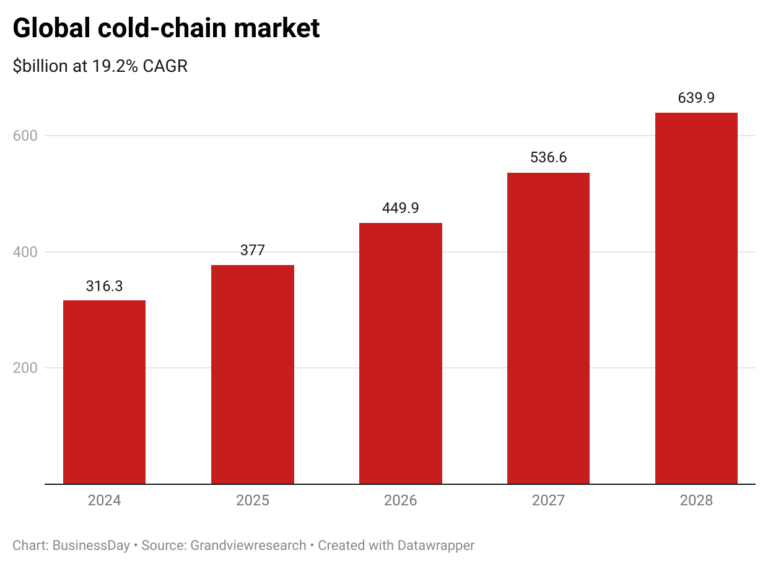Nigeria’s cold chain sector, valued at N160 billion in 2023, is ripe for investment, with massive opportunities emerging in storage and transportation solutions for perishable goods. However, the country faces a significant shortfall in cold chain infrastructure, with fewer than 1,000 cold trucks available, far below the 25,000 needed to transport over 11 million metric tonnes of perishables annually, according to a report by the U.S. International Trade Administration (ITA).
A Growing Market with Untapped Potential
The cold chain sector is rapidly becoming one of Nigeria’s most promising industries, offering a variety of investment avenues. From automated storage systems and the manufacturing of plastic crates for fresh produce to investing in refrigerated trucks, the opportunities are endless.
“The cold chain industry’s potential is massive,” said Alexander Isong, president of the Organisation for Technology Advancement of Cold Chain in West Africa (OTACCWA). “We’ve only just begun to scratch the surface,” he added, noting that the country’s cold storage capacity is nearly nonexistent.
Michael Akintese, co-founder of Ecotutu, a cold-chain logistics company, emphasized that Nigeria is operating at less than four percent of its cold chain capacity, costing farmers and agribusinesses up to N3.5 trillion annually.
The Role of Cold Chain in Nigeria’s Food Security
With rising demand for temperature-controlled logistics, the cold chain sector is increasingly attracting both local and international investors. Experts agree that this underdeveloped sector is crucial to Nigeria’s food security and agricultural sustainability.
Daniel Onwude, CEO of Coldtivate, a digital cold-chain company, highlighted the tremendous potential in the sector. “There’s a goldmine of opportunity waiting to be tapped,” he said.
Key Areas for Investment
To address the country’s cold chain infrastructure gap, experts point to several key investment areas:
-
Solar-Powered Solutions: Developing solar-powered cold storage and transport systems to mitigate power instability.
-
Cold Storage Expansion: Increasing the number of cold storage facilities and refrigerated trucks.
-
Last-Mile Delivery: Introducing refrigerated tricycles for last-mile delivery in rural areas to enhance accessibility.
Onwude also emphasized the importance of integrating smart technologies, such as IoT, RFID, AI, blockchain, and digital twins, to improve monitoring and control within the supply chain.
“Leveraging government incentives, such as free trade zones for infrastructure development, and building local expertise in cold chain logistics are key to fostering innovation and sustainable growth,” he added.
The Financial Impact of Cold Chain Solutions
Cold chain investments are already showing positive financial outcomes. Akintese noted that small businesses saw an average profit increase of 23.47 percent after gaining access to cold-chain solutions.
The Hidden Cost of Food Waste
Nigeria faces staggering food losses every year, with around 40 percent of its total food production spoiled post-harvest, particularly fruits and vegetables, which suffer losses as high as 70 percent.
The human toll is evident at every market stall. Fatima, a tomato vendor in Lagos’ Mile 12 market, shared her frustration: “We bring them from Kano, but half rots before anyone buys them. Sometimes, I lose up to 50 percent of my profits just like that.”
Haliru Abdulsalam, a fruit and vegetable trader, echoed similar concerns: “If my goods aren’t properly preserved, they spoil within two or three days. It’s a race against time—and we’re losing,” he said.
Cold Chain: A Solution to Food Insecurity
Experts believe that the cold chain sector has a vital role to play in addressing food insecurity in Nigeria. As Onwude pointed out, “The cold chain market plays a critical role in tackling food insecurity,” by ensuring that perishable goods are properly stored and transported, reducing waste, and improving food access for all.

